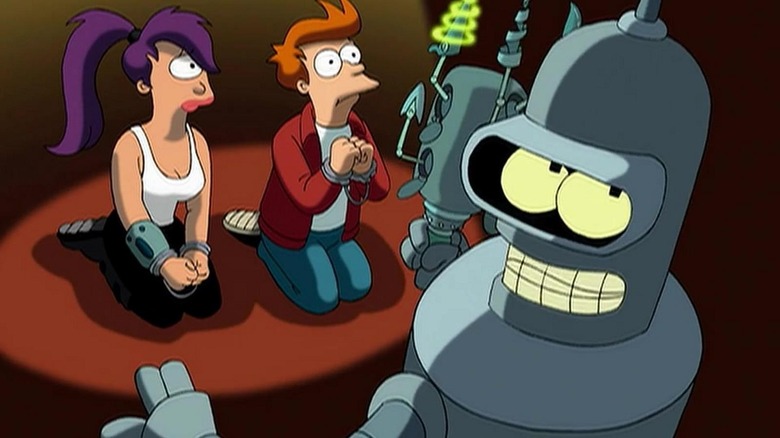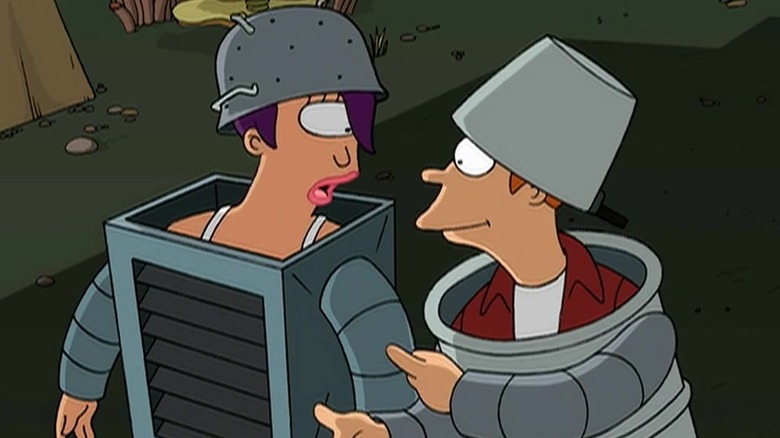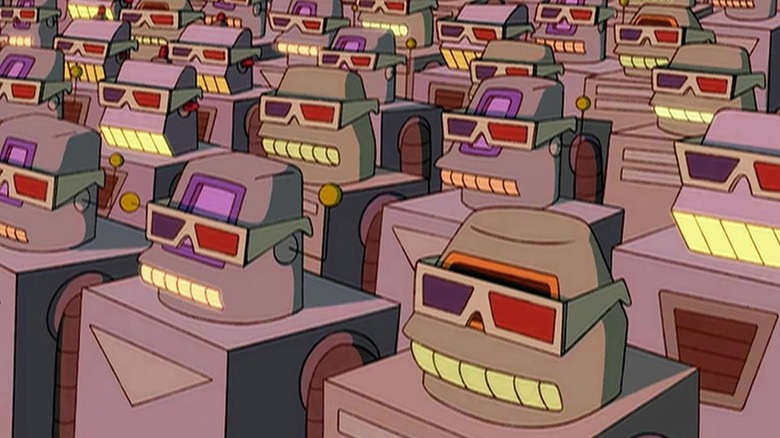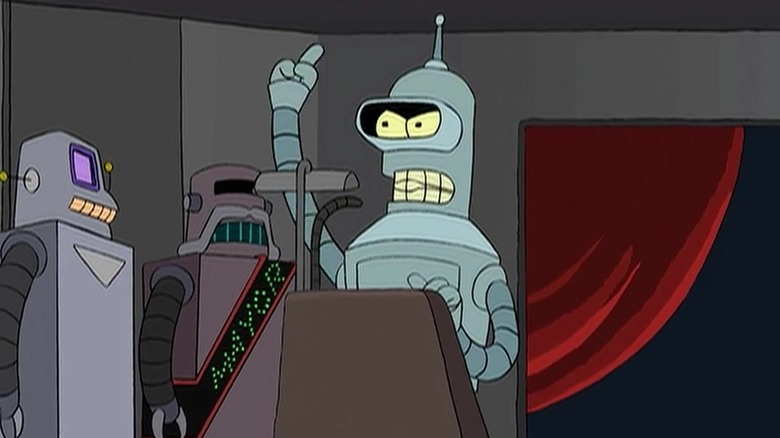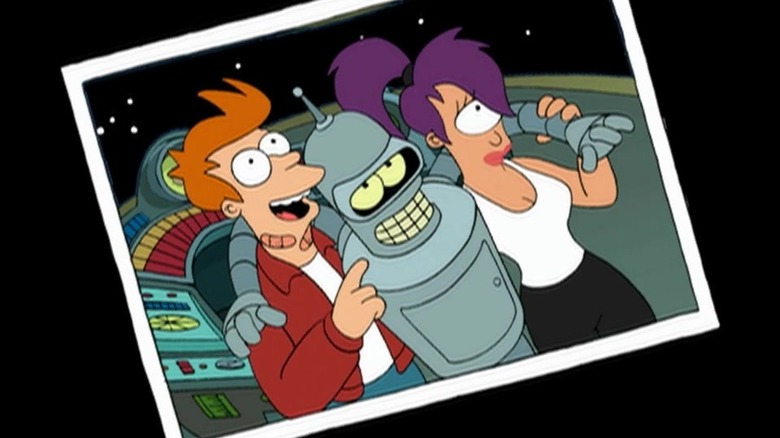The Classic Sci-Fi Story That Inspired Futurama's Bender
"The Simpsons" was not the first TV sitcom to parody pop culture, but it may have been the most ambitious one when it originally premiered. Some of its best episodes remake classic films with "Simpsons" characters. "Rosebud" recasts "Citizen Kane" with local wealthy despot Mr. Burns. "Bart of Darkness" puts child hellraiser Bart Simpson into Alfred Hitchcock's "Rear Window." Then there's the fan-favorite "Treehouse of Horror" episodes, which riff on classic horror films and television. A generation of young fans were given the "Simpsons" version of the canon before they even knew the source material existed. But that was not such a bad thing. At its best, "The Simpsons" is judicious in its pick of source material, and exacting in its detail. Characters in the show rarely just say, "This reminds me of a popular movie!" There's always a recreated "camera angle," a guest star or a deep cut joke that inspires the audience to dig deeper.
At first glance, "Simpsons" successor "Futurama" was no different. Early episodes spoof "Animal House" and "Armageddon." The presence of a talking Richard Nixon head links the series not just to the political instincts of "The Simpsons," but to series co-creator Matt Groening's earlier comic strip "Life in Hell." But "Futurama" is distinguished from both by its love of science fiction. Not just TV classics like "Star Trek," but short stories and novels by the likes of Isaac Asimov and Kurt Vonnegut. Standing in the middle of it all is Bender, a misanthropic robot and the show's breakout character. As voiced by John DiMaggio, he's a true original — except that he might never have existed without the influence of two groundbreaking science fiction writers.
Fear of a Bot Planet
"Bender being the most human character on Futurama does owe a little to Stanislaw Lem," said series co-creator David X. Cohen in a 2014 interview with Wired. Cohen proceeds to describe the plot of "The Eleventh Voyage" from Lem's classic story collection "The Star Diaries." In it, long-suffering space traveler Ijon Tichy is sent to Circia, a planet controlled by robots where many humans have disappeared. Tichy is disguised as a robot by his superiors, only to be caught and sworn into service as a human-hunter. It is then, at his lowest point, that Tichy discovers the truth: every robot on the planet Circia is a human in disguise. The real villain is not a computer overlord, but humanity's willingness to betray their neighbors in order to save their own skin.
"Futurama" loosely retold this story in "Fear of a Bot Planet," the fifth episode of its first season. Bender, his human friend Fry, and their alien colleague Leela go to deliver a box to Chapek 9, a planet ruled by robots. When Bender is kidnapped by the robots, Fry and Leela disguise themselves as machines and go after them. On the planet they fool a pair of robot guards and watch a scary movie about humans. Later, they discover that Bender has made a career for himself on the planet as an anti-human speaker. The robots in "Fear of a Bot Planet" are real, but the evil is familiar. Bender sells out his friends in exchange for comfort and security. The Elders that secretly rule Chapek 9 admit that they spur the public against humans to distract from material scarcity.
Eating little children
Stanislaw Lem was born in 1921 in what is now Lviv, Ukraine. A member of the Polish resistance through World War II, he and his parents left for Krakow, Poland, in 1946. Lem's fiction is not defined by his childhood experiences but certainly bears its scars. "The Eleventh Voyage" is a story of fascist collusion as much as it is a tale about robots and space travelers. It also skewers the Soviet Union, of which Poland was a satellite state. Lem's early novels, like "The Astronauts," toed the party line. His "Star Diaries" stories by contrast hid biting critiques of communism's worst tendencies. But Lem wasn't wholly convinced by capitalism, either. "Say, one country permits eating little children right before the eyes of crazed mothers," he wrote to his favorite translator Michael Kandel in 1977. "Another permits eating absolutely anything, whereupon it turns out that the majority of people in that country eat s**t." Such was Lem's opinion of the United States and its science fiction writers.
Lem could be a very funny writer when he wanted to be. To read "The Star Diaries," or especially his cycle of future robot tales "The Cyberiad," is to be submerged in a sea of nonsense words, puns, and dark comedy. The Encyclopedia of Science Fiction refers to these stories as Lem's "black grotesques," which explored the absurdity of the human condition through a science fiction lens. The best "Futurama" episodes operate in that same spirit. Certainly, Lem's work is never as sentimental as the likes of "Jurassic Bark." But Matt Groening and David X. Cohen, at their most daring, were just as willing as Lem to bite the hand that fed them.
R.U.R.
There is another writer whose work is tied to "Fear of a Bot Planet," and that is Karel Čapek: the Czech writer, playwright, and namesake for "Chapek 9." While the Nazis tormented Stanislaw Lem at the beginning of his life, Čapek spent much of his career predicting their rise. His most famous novel, 1936's "The War With the Newts," imagines the discovery of large intelligent newts on a faraway island. These newts are exploited for cheap labor by countries across the world, who see an easy opportunity to make money. But the newts leverage their grip on the economy to conquer the world. They also trigger widespread climate change and flood the planet. "Though he remains acutely contemporary in his sensibility and dread," the Encyclopedia of Science Fiction says of Čapek, "he may now most vividly be thought of as a recognizer." The Nazis feared him, but by the time they came to arrest him he had already died of an illness.
But the reason that Čapek's name appears in "Fear of a Bot Planet" is "R.U.R.", his 1921 play. It is the story of a man who creates a machine servant to do his bidding. This servant then leads an uprising to overthrow humanity, heralding the age of the "robot." "R.U.R." created the term "robot," which derives from the Czech word "robota" (meaning "forced labor") per The MIT Press Reader. Like in "War With the Newts," these robots are taken for granted by the establishment, only to replace them on the world stage. "R.U.R." therefore critiques what The MIT Press Reader refers to as "the efficiency movement that emerged just before World War I," which sought to measure human life by productivity. The tragedy of the play is that "humans and robots [...] are essentially one and the same."
Only man can be a bastard
Such is the plight of Bender in "Futurama." Bender hates humans, but at his core he isn't so different from them. The robots of Karel Čapek's imagination conquered the world because they were stronger than humans. Bender became a "Futurama" signature because he is weak. In his review of "Fear of a Bot Planet" for AV Club, Zack Handlen writes that the key to Bender's appeal is "his ability to feel aggrieved and slighted for no sensible reason [...] and still have his complaints come from an authentic, genuinely hurt place." Throughout the episode, Bender lies to his friends, abandons them, and then lambasts their home world for his own personal profit. He even lies to the robots who welcomed him for his own personal gain. At the end of the day, though, Bender doesn't have it in him to let his friends be executed. "Humans are no threat to us," he says to the Elders. After all, "they're stupid, putrid cowards."
Here, Bender puts his metal finger on the key to Stanislaw Lem and Čapek's robot stories: that robots and people are one and the same. Čapek's robots are created by humans within a system of violence and exploitation, and so their actions mirror that same violence. Lem's humans follow the workings of machines because of, rather than in spite of, their human vulnerability. "It's comforting to know," said Lem at the end of "The Eleventh Voyage," "that only man can be a bastard." Bender embodies these contradictions as a robot that wears his easily bruised heart on his sleeve. He's as much a "stupid, putrid coward" as the humans are, and that's why we love him.
